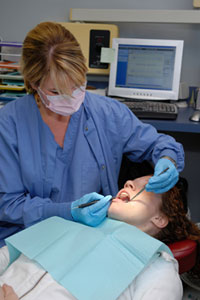|
|
ONTARIO INTRODUCES LEGISLATION WHICH WILL EXPAND PROFESSIONAL CORPORATIONS
On December 12, 2006 the Ontario government introduced Bill 171, the Health Systems Improvements Act, 2006. Schedule “B” to the legislation proposes changes to the Dental Hygiene Act, 1991 which will permit dental hygienists to perform various services for patients without the need for supervision by a dentist. Meanwhile, Schedule “P” to this legislation introduces the new Naturopathy and Homeopathy Act, 2006. Both of these changes will affect the way that dental hygienists, naturopathic doctors and homeopathic doctors conduct their practices.
For dental hygienists, they could previously incorporate professional corporations, but since they were tied to working under the supervision of dentists, as a practical matter it made little sense for dental hygienists to proceed with incorporation. However, now that dental hygienists could be establishing their own stand-alone practices, this is an issue that should be re-visited.
Lower Taxation Rates
The typical business model for those professions which could not establish
professional
Under a professional corporation all income may be received by the professional corporation. The corporation can then, in turn, either pay the revenues to the practitioner in the form of a salary or bonuses or, more importantly, in the form of dividends. Dividends on shares can result in important tax savings to the practitioner and these savings could apply to the entire amount paid – rather than to just 15% paid under the management company arrangement. These savings will exist for companies with revenues up to $400,000 (as of January 1, 2007) and should cover most health professional corporations. You should consult with your accountant or financial advisor to determine if the taxation savings are a sufficient incentive to proceed with a professional corporation.
Liability Protection in Some Instances
Corporations also provide protection from liabilities that would not otherwise be available to the practitioner. As a sole proprietor, the practitioner is liable for all claims and debts of the practice. The use of a professional corporation can reduce some of these liabilities. For example, significant contracts for supplies or long-term leases can now be entered into by the professional corporation. If the practice should suffer a down-turn for any reason, the practitioner may be able to protect his or her personal assets from the claims of creditors if the arrangements were made through the professional corporation.
It is important to note, however, that malpractice or other similar negligence claims will not be protected. Practitioners will not be able to avoid this form of liability through the use of a professional corporation.
Requirements for Establishing a Professional Corporation
Only dental hygienists, naturopathic doctors or homeopathic doctors who are licensed members of their respective College can be shareholders, officer and directors of the professional corporations. At the present time, only doctors and dentists are permitted to create professional corporations with non-member shareholders (ie. immediate family members). It remains hopeful that the other professions will be provided with this advantage within the next few years. This ability to provide for a very significant “income split” will provide for a large taxation advantage once it is provided to professionals other than doctors and dentists.
Should You Convert Your Practice to a Professional Corporation?
There are definite advantages to converting your practice. Dental hygienists, naturopathic and homeopathic doctors are encouraged to consult their accounting and legal advisors to determine if this would be a benefit for their practices.
The Law Office of Christopher A.L. Caruana would be pleased to assist you in this process. For inquiries, we may be contacted at (416) 204-0155 or via electronic mail at info@ontariolegal.com |
 |
 Until recently, naturopathic and homeopathic doctors were governed
by the antiquated system established under the Drugless Practitioners
Act (the “DPA”) – which has now been repealed. Unlike
other health profession legislation, many practitioners governed by
the DPA were not governed by the Regulated Health Professions Act. This
included
naturopathic and homeopathic doctors. As a result, they were
not permitted to incorporate health profession corporations, unlike
other medical and health practitioners. This has now changed
with the passage of the new legislation. Naturopathic and homeopathic
doctors are now included in Schedule I to the Regulated Health
Professions Act, and they can therefore incorporate health professional
corporations.
Until recently, naturopathic and homeopathic doctors were governed
by the antiquated system established under the Drugless Practitioners
Act (the “DPA”) – which has now been repealed. Unlike
other health profession legislation, many practitioners governed by
the DPA were not governed by the Regulated Health Professions Act. This
included
naturopathic and homeopathic doctors. As a result, they were
not permitted to incorporate health profession corporations, unlike
other medical and health practitioners. This has now changed
with the passage of the new legislation. Naturopathic and homeopathic
doctors are now included in Schedule I to the Regulated Health
Professions Act, and they can therefore incorporate health professional
corporations. Unlike other corporations, professional corporations are restricted
to carrying on the business of the profession and to related activities
(including the investment of funds generated by the corporation). Therefore,
the corporation will only be able to carry on the practice of a dental
hygienists or a naturopathic or homeopathic medicinal practice. Operating
a travel agency, for example, as a division of the professional corporation
(which would be permissible for other forms of corporations) will not
be permitted.
Unlike other corporations, professional corporations are restricted
to carrying on the business of the profession and to related activities
(including the investment of funds generated by the corporation). Therefore,
the corporation will only be able to carry on the practice of a dental
hygienists or a naturopathic or homeopathic medicinal practice. Operating
a travel agency, for example, as a division of the professional corporation
(which would be permissible for other forms of corporations) will not
be permitted.